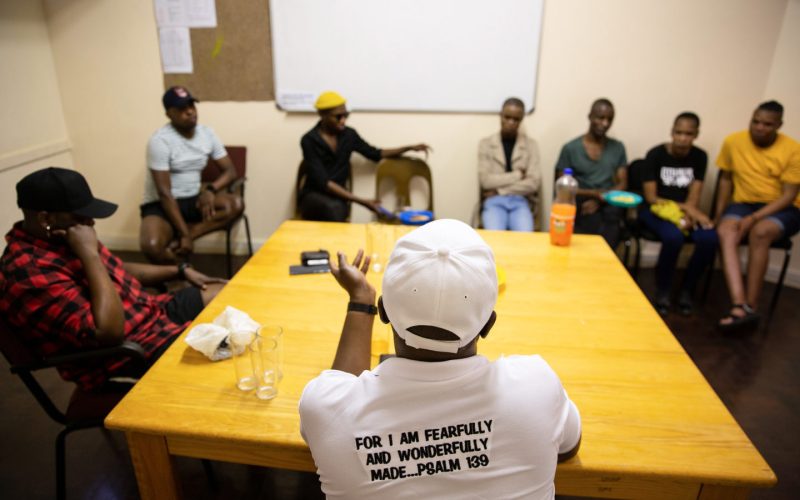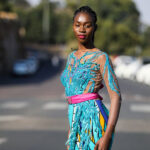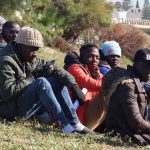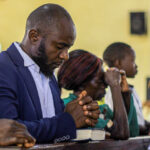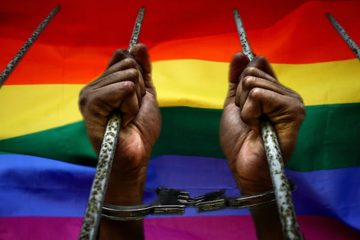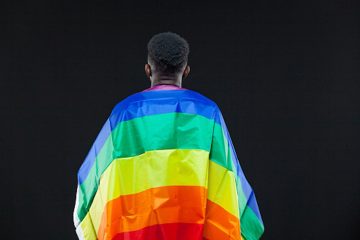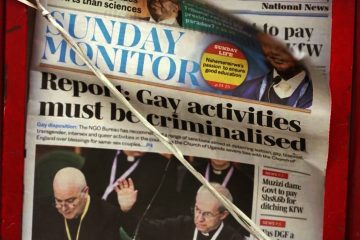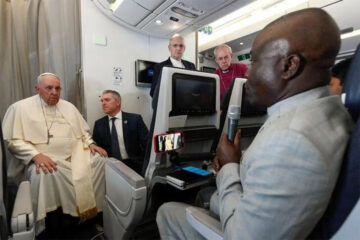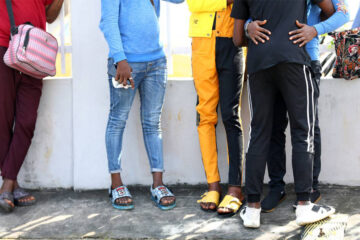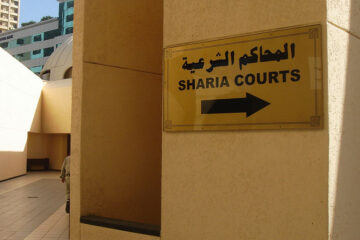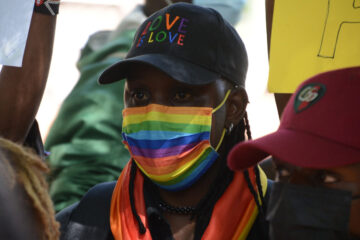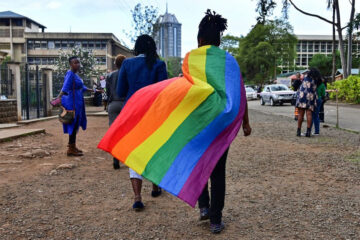CARL COLLISON
IN a drab room in the cavernous basement of the Holy Trinity Catholic Church in Braamfontein, a colourful group of queer folk are catching up on gossip. Lockdown restrictions mean it has been a year since they’ve been able to meet face to face. So on this particular Sunday afternoon, there is much to catch up.
“Shall we pray?” Dumisane Dube, 49, says firmly, putting an end to the idle chatter and kick-starting the meeting. “We ask you, Lord, to guide us and protect us,” the person tasked with praying implores in closed-eyed supplication. Thus begins another meeting of the church’s LGBT Ministry.
Holy Trinity parish priest Russell Pollitt began speaking out about increased queerphobia fuelled by religious conservatism in 2009. Feeling that although “referencing LGBT rights during Mass was important … it wasn’t enough”, Pollitt, together with church congregant Ricus Dullaert, established the dedicated ministry.
Despite initial objections about the “homo heresy” taking over the church and “an undercurrent of dissatisfaction” in the parish, the fortnightly meetings continue to take place 12 years later.

It is in these meetings, held in the church’s numerous basement rooms, where the idea for John Marnell’s book, Seeking Sanctuary – Stories of Sexuality, Faith and Migration, was born.
The book tells, in first-person accounts, the stories of queer migrants, refugees and asylum seekers who have been rejected based on religion, and their battle to reconcile their faith with their sexuality. For the book’s narrators, they have found a healing space in the LGBT Ministry.
“I think [the ministry] is, in itself, one of the characters and one of the narrators of this book,” says Marnell, adding that it started as an archival project. “We didn’t always have a book in mind. But at one point, I went oh my God, these stories are so great in unexpected ways. You know, when people are talking about cruising at Park Station, or having a party in Nigeria or things like that…
“These things get so missed from our popular ideas of displacement and migration that it just felt wrong to keep them hidden away in an archival collection. We [felt] they deserve an audience and they deserve value and respect and appreciation.”
A reunion of sorts
Back in the meeting room, members are asked, “What have you been up to over the past year?” One person speaks of the “very difficult journey” of heeding the call of their ancestors and “going to the mountains”. Some speak of career losses, others of career gains.
There are moments of pride (“I’m really happy where I am”), moments of concern (“Why are you not vaccinated yet?) and moments of mirth (“Polyamorous means, basically, you are a whore”). Advice is offered and keenly received.
Dube is the ministry’s coordinator and has been since 2010. The group’s members refer to him, with jocular affection, as “daddy”.

7 November 2021: Dumisane Dube catches up with the LGBTQIA+ group in the meeting room at the church. It’s been a year since they could chat in person owing to lockdown restrictions. Photographer: James Oatway
“My son is in the ministry, and after he called me daddy, they all adopted it and decided to call me daddy,” Dube laughingly explains.
After the year-long forced hiatus, he says, “the most important thing was to see each other in one place, to see that [everyone is] healthy and to update each other on how they’re doing career-wise, social-wise and in life in general. We live like a family. So we have to see each other and see how we can be helping each other and encourage each other.
“The group was very different before. Everybody [was] complaining of unemployment, complaining of not going to school. But now it’s getting better because people are going to work, people are going to school. People have ambitions, people have visions, people have dreams. So it’s excellent now.”
Overcoming resistance
It was not easy getting to this point. There was, from the get-go, an unwillingness to accept the ministry. “Our parish is a parish that receives mostly people from different countries. And so, being from different countries and different cultures, people didn’t understand what LGBTI means,” Dube says.
“And with that lack of knowledge, some would give me phone calls and tell me that I’m teaching the ways of the devil and stuff like that. They wanted me to shut down the group. But, of course, with the support of the parish priests and the pastoral parish council, the group is still there.
“We are now working harmoniously with the parishioners. Some may have different opinions about us, but they have come to a keen understanding that we have to work harmoniously for the good of the work that we are doing.”
Concurring with this, Marnell stresses that the ministry has existed for “12 years, often with no funding and just a bit of support from this one parish. And often in the face of, you know, hatred and critique and anger. And they’ve just kept providing this critical space for people who are looking for connection and family and belonging and a spiritual home.”

Although the majority of the ministry’s members are LGBTQIA+ migrants, refugees and asylum seekers, it also offers this spiritual succour to queer South Africans.
Zee, 30, is the only South African narrator in the book. In her story, she speaks of being excommunicated from her church (“I lost a part of myself that day”) after coming out as lesbian.
“Discovering the ministry was a safe haven for me. It felt like a home away from home, something new, something I’ve never actually even experienced… I didn’t even know there [could be] such connectivity, if you get what I mean. They became my go-to place whenever I needed comfort or any advice with no judgement,” says the Soweto resident.
A healing achievement
Zee laughs as she recalls seeing the book, with her story in it, for the first time. “When it was delivered, I screamed out of joy. I was like, finally.
“And it’s funny how the people I know that wrote the book – I’m going include myself – we have grown to understand ourselves. We ourselves have grown. And I think for me it’s a journey that we had to embark on. And then you actually sit down and go like, yoh, this is where I’ve come from. Like, I’m proud of us all.”
But the process of sharing her story with Marnell was a tough one, she says. “Allowing John into my world – because I feel like it was a personal space that I’ve never shared with anyone – and to share it with everyone, publicly, was a catch-22. Because at some point I was like, maybe I’m sharing a little bit more than I should. Maybe I shouldn’t put this [in]. What would my mother think if she were to read this? Is it out of disrespect or out of guilt that I’m writing this?
“But it has been, as well, a form of healing. I’ve healed a lot. I feel like I forgave myself for allowing myself to be brought down and allowing myself to be told that I’m not worthy enough [because] of my sexuality. And I thank God for the journey, because if it wasn’t because of that, I think I’d still be living in the past. So yeah, I think it was a huge turning point.”

Four years after setting out on his first interview, and with his book now finally becoming a reality, Marnell says: “I think my biggest hope is that it encourages people to see LGBTIQ migrants, refugees and asylum seekers as complex, multifaceted individuals.
“It’s really important to me … that people recognise that suffering and persecution is a huge aspect of their experiences, yes, but we cannot reduce their lives to that. I think it plays a very kind of tactical political role sometimes, when we need to draw attention to certain things as part of our advocating for change and our mobilising communities.
“But sometimes, you know, once we get into that single story kind of loop, it becomes very, very damaging. But I think that also applies to faith communities who, I hope, will get a better sense of what LGBTIQ people of faith have gone through, and who they are, so that they can be treated with dignity and respect within faith spaces.”
For his part, Dube hopes the book will inspire others to follow in the ministry’s footsteps. “Any religious place, any place of worship, any place of spiritual advancement … could start a group like this and receive people that are so much in need of getting back in touch with their spirituality, in touch with their beliefs, in touch with their faith – and be free to be who they are at the same time.”

